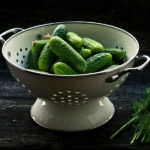Rediscovering Production
To consume means to destroy. That’s why “consumption” was the name given to tuberculosis.
– Vandana Shiva[i]
– Vandana Shiva[i]
Producing food. For the most part, people alive today have lost touch with this most basic of human activities. Instead, we have become consumers. We acquire things. We accumulate things. We value ourselves and others based upon the things we have accumulated. Quite a few people are now trying to “green” their lives and plant gardens, but (as a recent L.A. Times article inadvertently demonstrated) if they remain immersed in that acquisition mindset, their “greening” efforts simply don’t pan out.
We have forgotten what it means to truly produce – to produce the basic food necessary to sustain our bodies, to locate and capture water, to make clothing and build basic shelter. Our food gardens are, for many of us, our initial foray toward learning what it means to become a produceragain. And becoming a producer goes far, far beyond “having” a vegetable garden, or anything we can go “buy” at a store.
Becoming a producer means leaving behind the acquisition mindset. There is a reason we have the phrase “working a garden” in our language. It takes work: muscles, sweat, sometimes tears. Reacquiring the lost art of growing food means learning new skills. It means growing: growing plants and growing a new sense of who you are. It means stretching: both your physical body and your psyche.
Even when you go out and buy a garden-ready 6‑pack of vegetable seedlings, there will be no guarantees. If you plant them in searing sun, you may get curly, withered little sprouts. If you forget to water the plants, they will dry out and die. If slugs crawl over from the nearby overwatered lawn, they’ll eat all the tender young shoots. Or sprinkler overspray might cause mildew.
This is nature. This is the wild world of your urban back yard, which comes complete with opossums, hungry birds, and cabbage white butterflies. You’ve emerged from the slick and shiny artificial world of climate-controlled, chemical-cleaned, overprotected buildings into the precarious real world, where the vagaries of sun and rain and wind and grasshoppers rule. Humans are estranged here. We don’t fully get it, and we cannot control it.
For a very brief period of human history we have told teach other a myth: that humans were above it all, that we could control life forces with our intellect, with paper dollars, and with the harnessed power of fossil fuels. Mother Nature let us think humans were winning for a little while, but now the truth is dawning upon us: Humans are part of a vast and myriad interconnected web of life.
The folly is over, and we are suddenly faced with an urgent need to learn how to fit in. We need to learn how to produce food without fossil fuels, how to capture water in areas where this resource is precious, how to clothe and shelter ourselves with local materials and far less impact on the planet. We need to learn how to fit into the lifecycles of this small planet and how to fit into the specifics of our local place upon this planet.
Gardening food is about feeding our families. It is about access to clean, organic, health-building, truly-fresh food. Growing food is about the most basic nourishment – of body, mind, and spirit. As you read these pages and venture deeper into the world of food growing, it will change you. It will touch you in ways you cannot even imagine.
The word “touch” is key. At the Community Garden at Holy Nativity, here in the Westchester area of Los Angeles, we have noticed a few things: Once people begin to get their fingers into the soil, the changes begin to unfold. Perhaps you begin by buying a plastic pot and some potting soil and a little 6-pack of chard to plant out on your balcony. You find yourself drawn to check on your little plants. Maybe you amble outside clutching your morning cup of coffee, to see whether they’ve grown overnight. You might notice that the soil around your babies dried out; the weather was a little hotter yesterday. If you were still inside a climate-controlled office, you might not have noticed the weather, but now you do.
The potting soil is pricey, but soon you learn that you can make your own, so you begin to compost your kitchen scraps. One weekend perhaps you get impatient – one pot of chard isn’t enough for a garden, you yearn to grow more. You find a spade and dig up a rectangle of lawn. Your journey has deepened.
You notice that rainwater makes your plant babies grow better, so perhaps you venture into capturing rainwater. You hear about an unusual Italian vegetable and at a seed swap you discover seeds. Your plant palette broadens a little, and with it your dietary choices. You learn the injustice of “food deserts,” and yearn to help out. Suddenly you’re volunteering to create new community gardens for others, even as you are learning yourself.
We warn you: It won’t stop.
You thought you could go out and buy a few things to “get started” in gardening. And in that you were partially right: it was a beginning. It was the beginning of evolution into a whole new outlook – upon society, upon the world, upon life itself.
Welcome to the journey. You are beginning to grasp the clean, fresh feeling, the wholesome pride, of what it means to become a producer again.
|
The scale of how much food it really takes to feed a family is astonishing –many bags of vegetables per week. The prospect of achieving a large part of this with locally grown food is absolutely staggering.
The scale of how much food comes out of a biointensively-planted urban space under yield-conscious design is quite amazing! Bins and bins, week after week, even on days when our garden team had thought in overview that there would be “not much to harvest.”
|
[i]Vandana Shiva, Manifestos on the Future of Food and Seed, South End Press, 2007
Previous
A future that is ...
Newer

